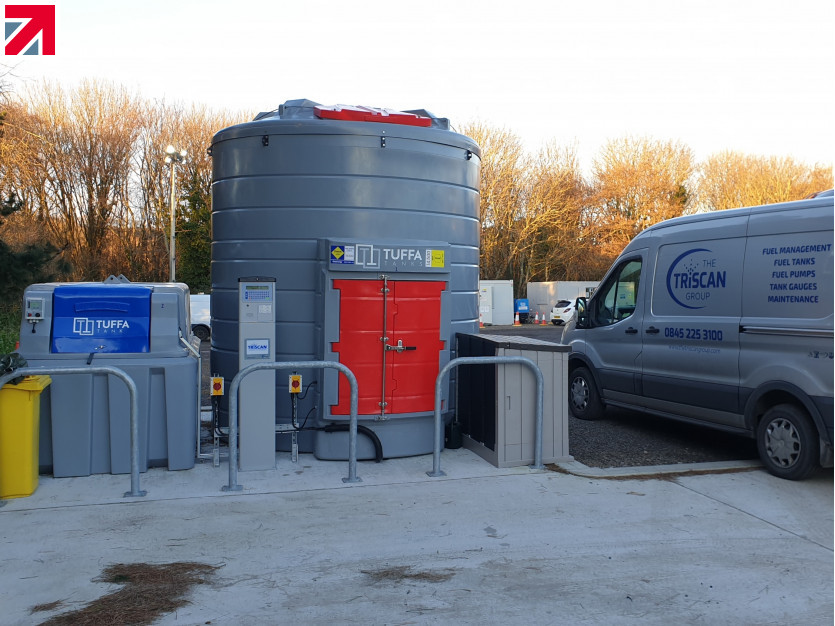From fleet operators to farmers, for many industries having bulk diesel and AdBlue storage on-site is essential. Buying in bulk helps companies to secure the lowest fuel and AdBlue prices while on-site storage gives companies more security by reducing the risk of running out of these essential liquids. When combined with a fuel management system, storage tanks can even help to monitor and improve fuel usage, for example by highlighting underperforming vehicles or drivers who would benefit from additional training.
However, along with the advantages of on-site storing comes associated hazards. Oil leaks are extremely detrimental to the environment; if oil runs into surface or groundwater it can suffocate fish and destroy ecosystems in streams and rivers. Just one litre of oil can contaminate 1 million litres of water. With UK drinking water supplies coming from rivers, reservoirs and groundwater, the clean-up measures can be huge. Even without reaching water sources, oil spills can kill plants and organisms which contribute to healthy soil. Oil spills occurring near buildings can result in expensive restoration work or in extreme circumstances lead to buildings being demolished entirely.
Clean-up costs for these spills can be huge and insurers may not pay out if the leak has been ongoing or if it resulted from negligence including poor maintenance. According to Adler & Allan, environmental risk management company and Tuffa Reseller, oil spills cost businesses an average of £30,000. Oil spills on land are also more common than you might think with 3,000 pollution incidents reported in 2020.
To help prevent leaks it is vital to comply with oil storage regulations. Oil storage regulations throughout the UK require most non-domestic oil tanks to have a secondary containment or ‘bund’ capable of storing a minimum of 110% of the inner tank’s contents. A single skin tank can be contained within an open masonry bund but most tanks will be integrally bunded – essentially a tank within a tank.
While always good practice, a bund is particularly important when spills and leaks risk entering water sources e.g when tanks are installed within 10 meters of coastal or fresh waters, within 50 meters of a drinking water source, or within the inner groundwater source protection zone. Failure to comply with these regulations can result in a fine or prosecution and the Environmental Agency can serve an Anti-Pollution Works notice to ensure you bring your oil storage up to legal standards.
Despite there being no enforced AdBlue storage regulations in the UK, it is polluting to surface and groundwater and can also destroy wildlife. The Environmental Agency has therefore issued storage guidelines including the use of a bund for AdBlue storage. Again, under the Anti-Pollution Works Regulations you can be issued a notice to make appropriate improvements to your storage facilities.
With severe environmental risks and financial penalties inherent in the storage of fuel and AdBlue it’s vital to take mitigating measures to prevent oil spills while simultaneously protecting your business and assets. New or existing storage tank installations should always be bunded and a suitably competent person should conduct regular visual checks and storage tank maintenance. This should include visual inspections on:
- Plastic tanks looking for signs of excessive bulging, change in colour due to chemical attack, crazing or stress fractures
- Steel tanks looking for evidence of rust and heavy corrosion, damp patches on seams and seam fractures
- The bund for soundness and integrity, spilt product or debris
- Around the tank’s base for signs of a leak including dead grass and discolouration of the surrounding area
- All pipework, outlet valves, the fill point arrangement and vents.
Additionally, any equipment such as the contents gauge, any high level/overfill alarm and bund alarm should be tested.
Whereas minor damage or rust to steel tanks can often be repaired, plastic tanks should be replaced when displaying any signs of bulging or cracks which affect their structural integrity and risk leading to spills. It should also be noted that plastic tanks from reputable manufacturers will have a minimum design life of 20 years and steel tanks 30 years. While correct installation, servicing and maintenance help to achieve the minimum design life, once exceeded it is time to consider a new replacement tank.
Poor diesel and AdBlue storage practices can be crippling for businesses with huge financial costs, environmental costs and the cost to the integrity of the business. We strongly encourage you to perform these basic maintenance tasks and replace any tanks which are incompliant and risk causing leaks. We also fit an integral bund to all of our steel and plastic diesel tanks and AdBlue tanks to help ensure your site is compliant and protected.
Find out more about Tuffa Tanks on their member profile page here
Member-created content 3 years ago | From members

